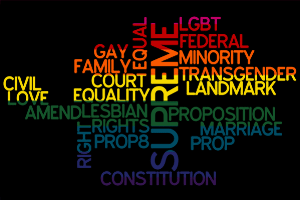
Image: <a href="/authors/celine-nadeau">Celine Nadeau</a>
READ ALSO: MoJo’s Josh Harkinson on San Francisco’s family night and Celia Perry on why she’s been waiting for this ruling since the third grade.
Back in February, the San Francisco Chronicle took the bold step of outing Judge Vaughn Walker, who ruled today, in Perry v. Schwarzenegger, that Prop 8 is unconstitutional: “The biggest open secret in the landmark trial over same-sex marriage being heard in San Francisco is that the federal judge who will decide the case, Chief U.S. District Judge Vaughn Walker, is himself gay.” This was well-known among San Francisco court reporters (who didn’t feel it was all that important) but juicy news to the right. Fox News ran a headline today asking, “Why Has Media Ignored Judge’s Possible Bias In California’s Gay Marriage Case?” The National Review has argued that the judge should have recused himself from the case because a judge must do so when he has any “interest that could be substantially affected by the outcome of the proceeding” (28 U.S.C. § 455(b)(4)).
Of course, while this plays well in the conservative media, it would be a tough argument to make in the courtroom. To state the obvious, arguing this point could mean conceding that there is a substantial difference between a domestic partnership and marriage, something the Prop 8 defendants have steadfastly denied.
The larger point, however, is that it doesn’t matter what Walker’s sexual orientation is. He’s an extremely well-qualified judge who, despite the right’s complaints, has shown himself to be an impartial and unbiased jurist throughout his career and this trial. Actually, as the two-and-a-half-week trial began, there were some serious concerns in the LGBT community. After all, this is the same Judge Walker who was appointed by George HW Bush after a failed appointment by Ronald Reagan; the same Judge Walker who was harshly criticized by Nancy Pelosi for being insensitive to gays; and the same Judge Walker who prevented the “Gay Olympics” and put a lien on an AIDS-stricken organizer’s home.
Throughout the court trial, he peppered both sides with equally tough questions. Interjecting often, he was clearly an engaged and active participant. He gave little quarter to either attorney, and it showed in his follow-up questions during closing arguments. There, it became clear that not all arguments are created equal, and given the number of “I don’t know”s and “I don’t have to prove anything”s that the Prop 8 defenders responded with, the right has only intself to blame for Walker’s ruling. (See page 144 of the closing arguments transcript [PDF].)
However, while his sexual orientation does not matter from a legal perspective, it does put the judge in a tough position politically and personally: No matter how he ruled, he was bound to come off as biased, insensitive, or both.













